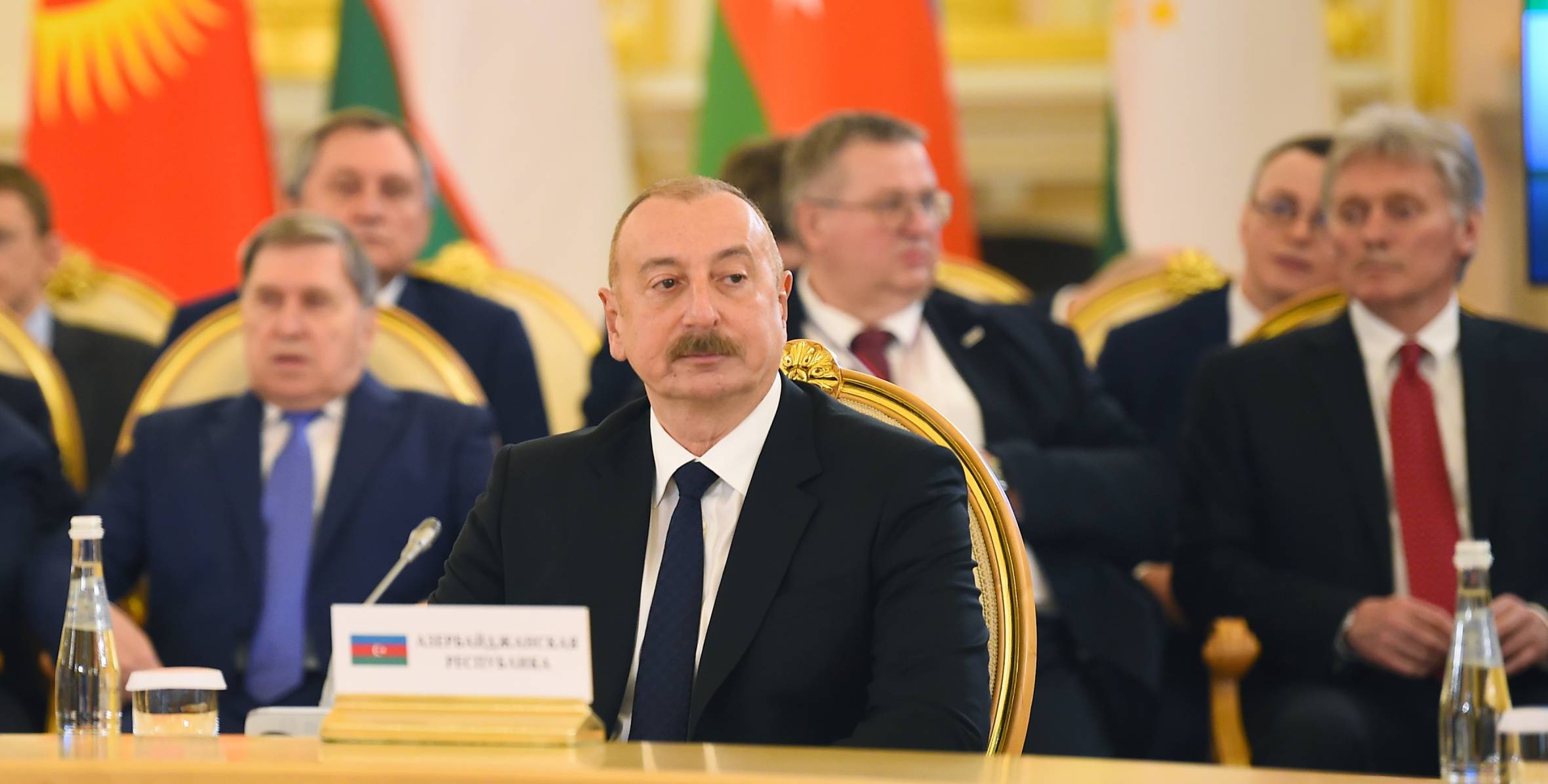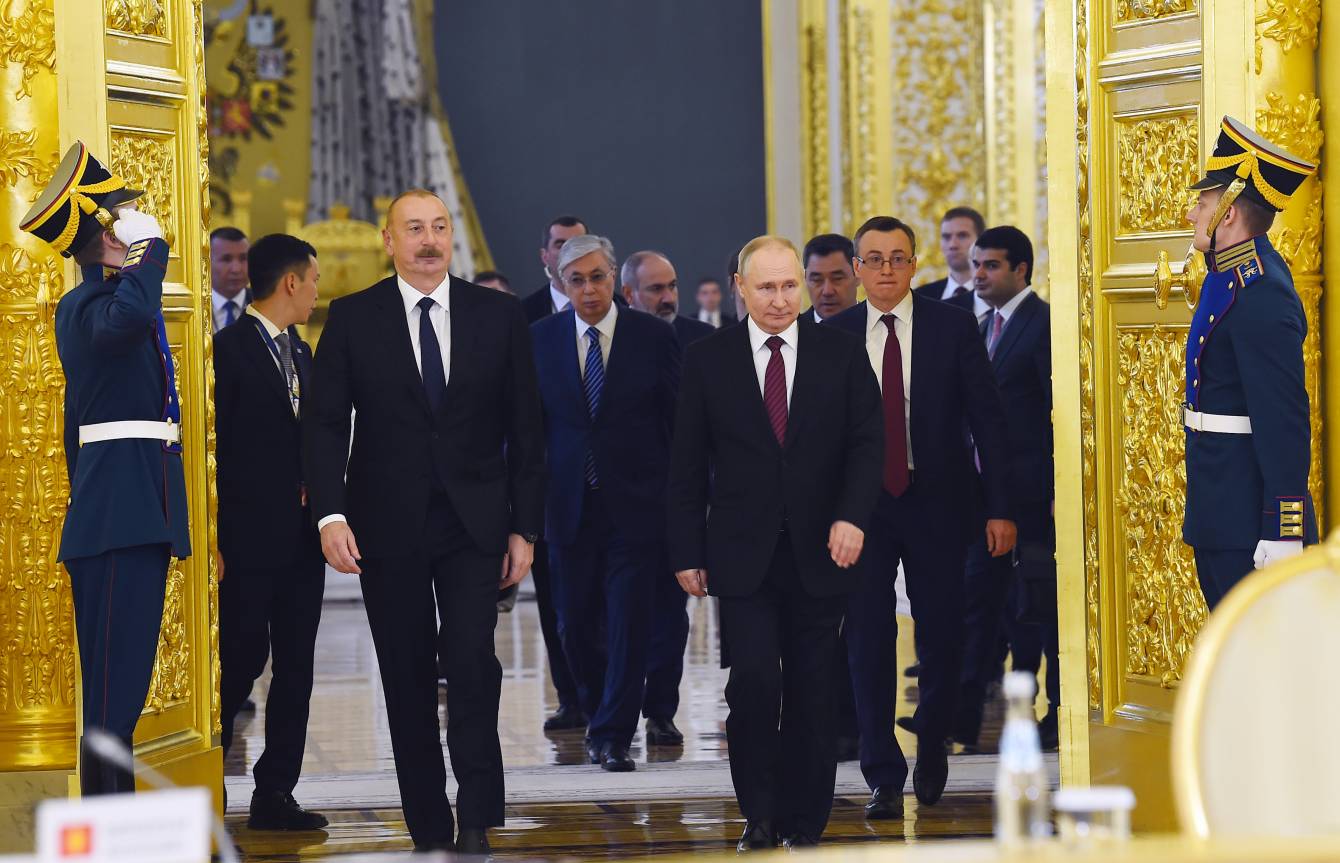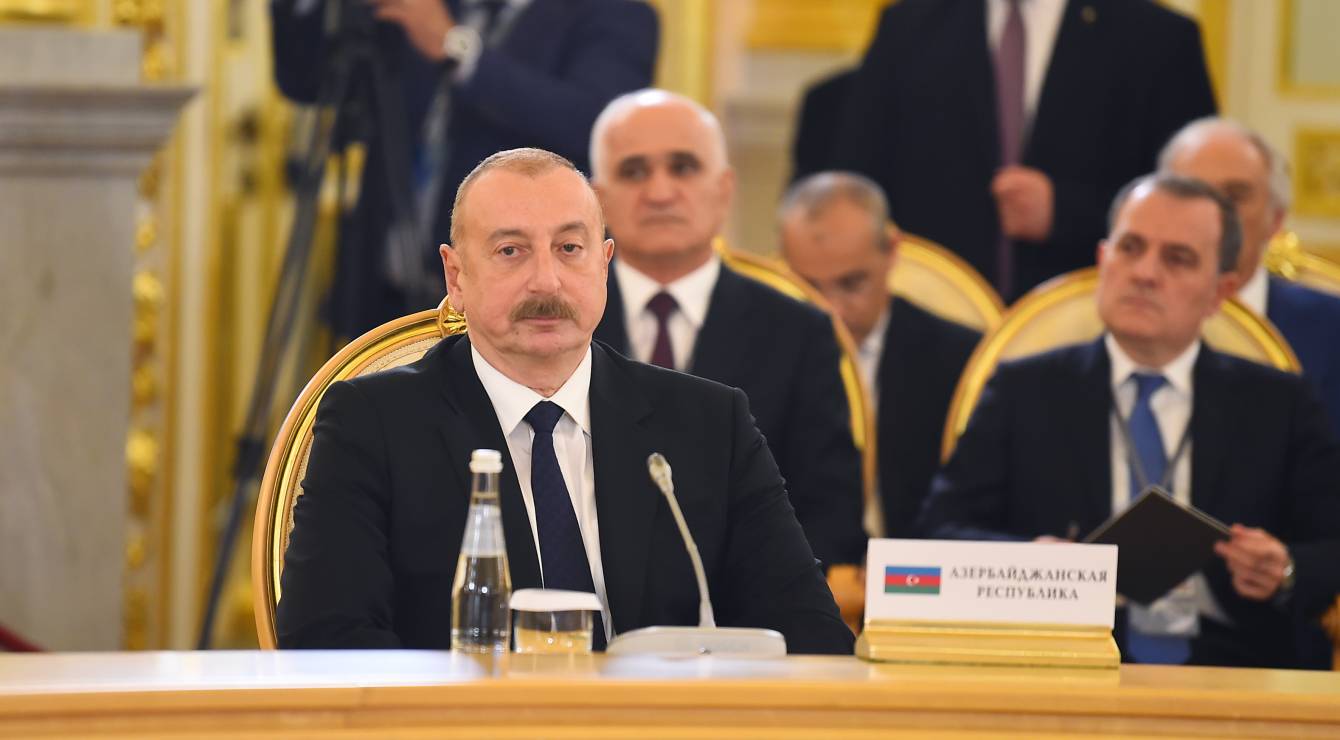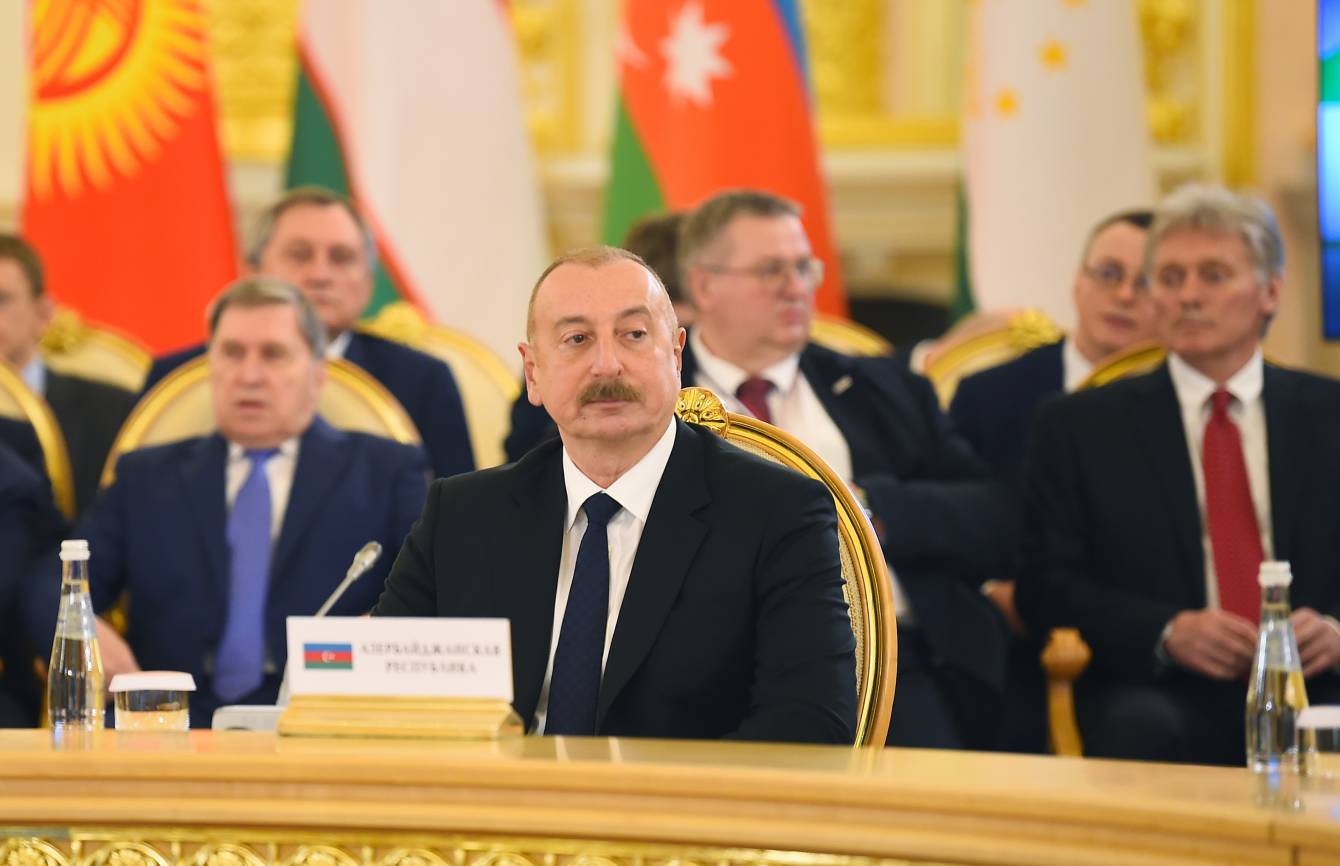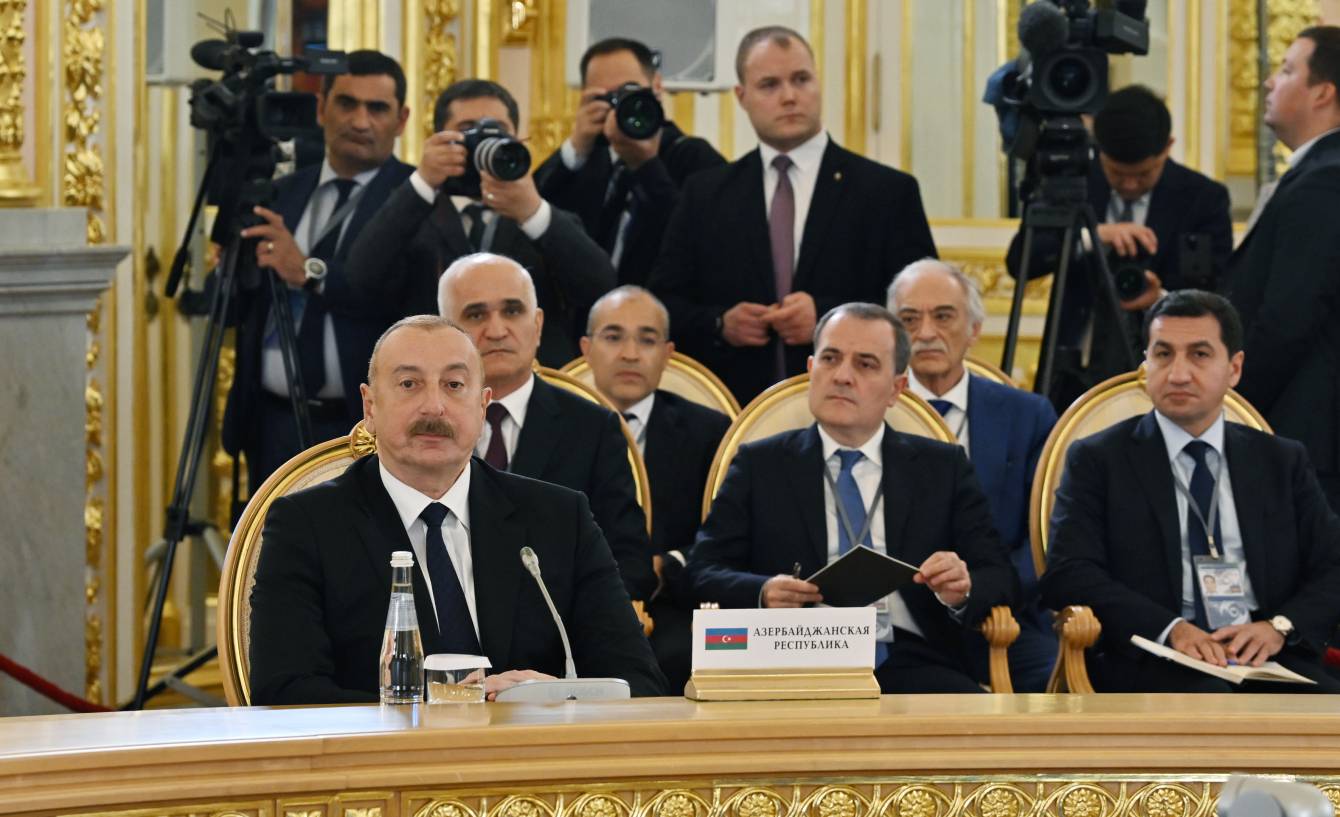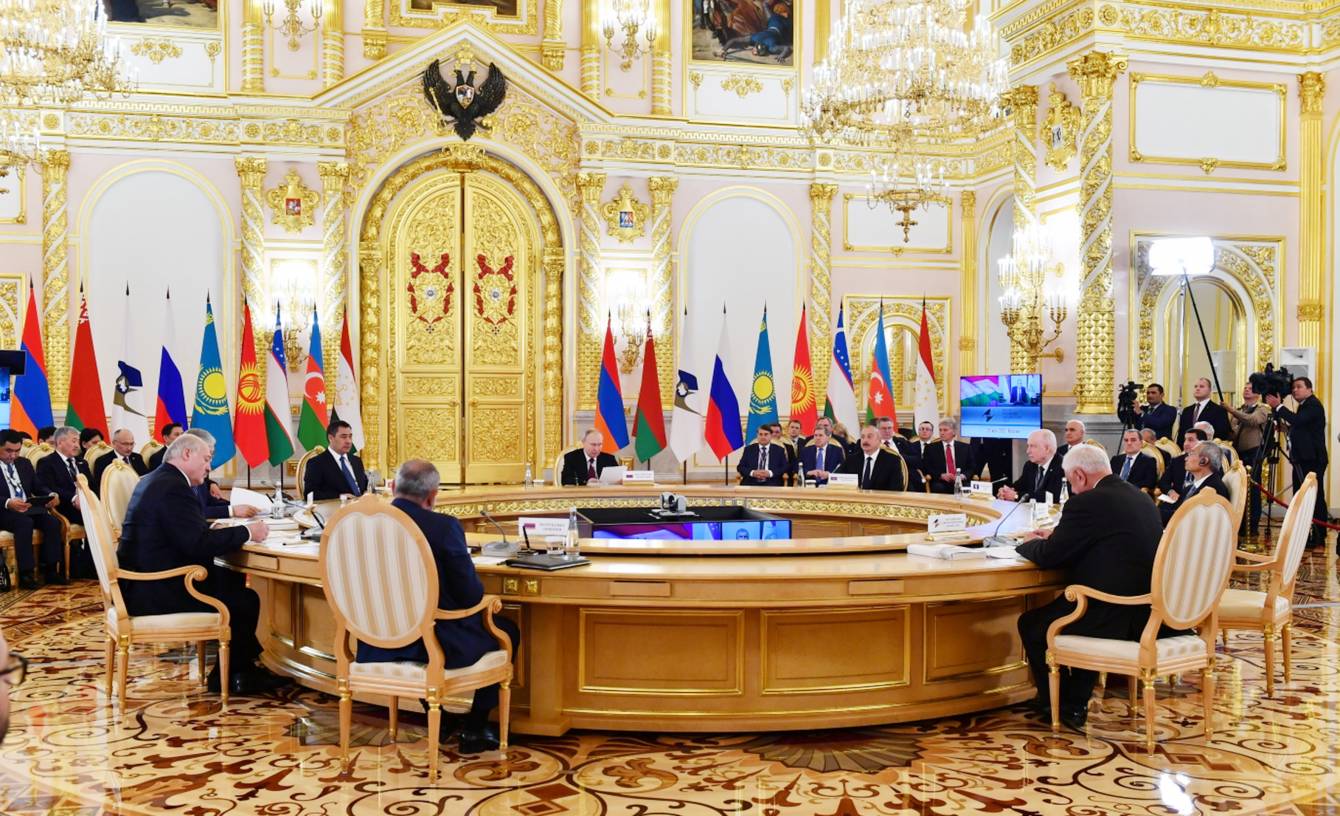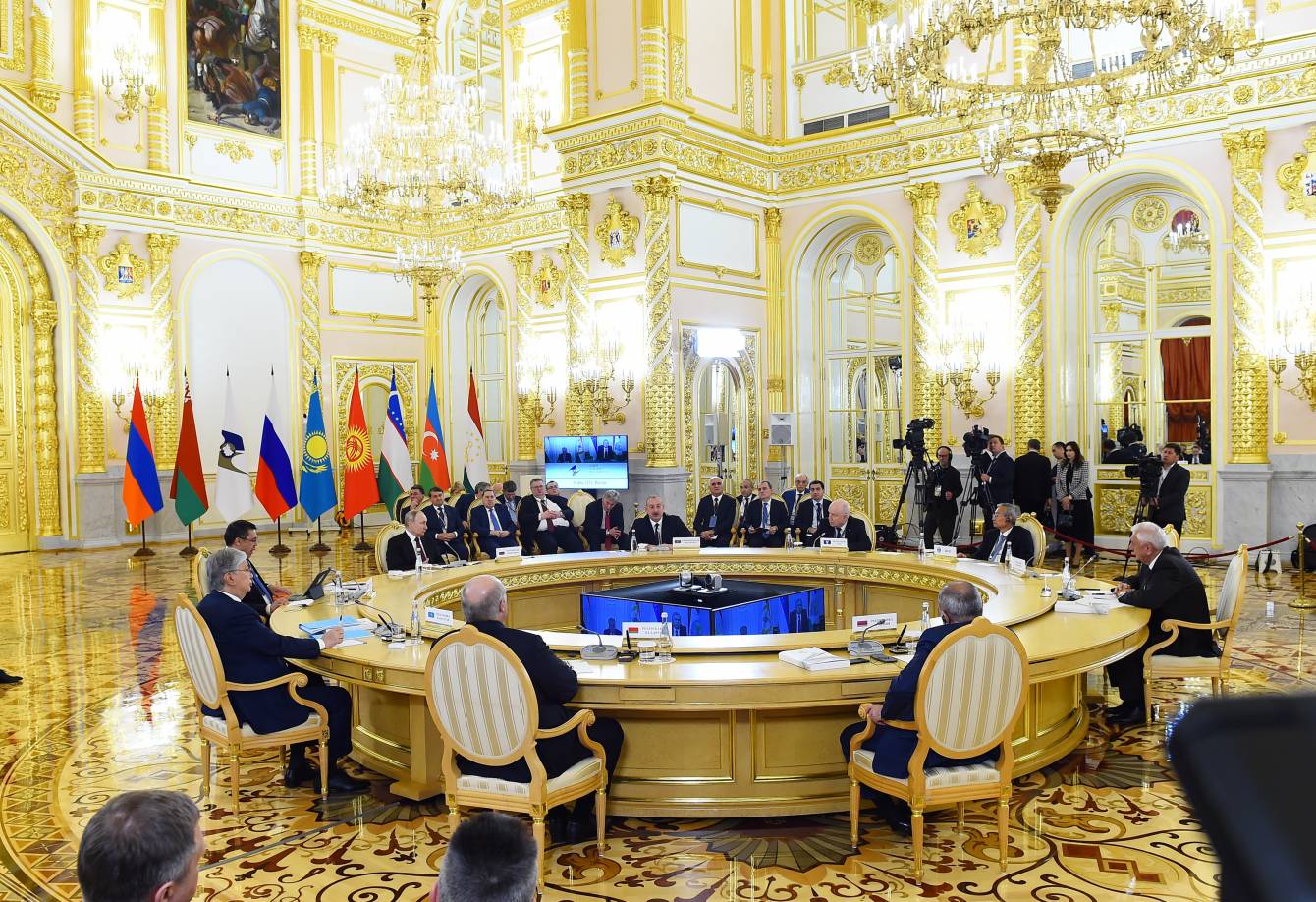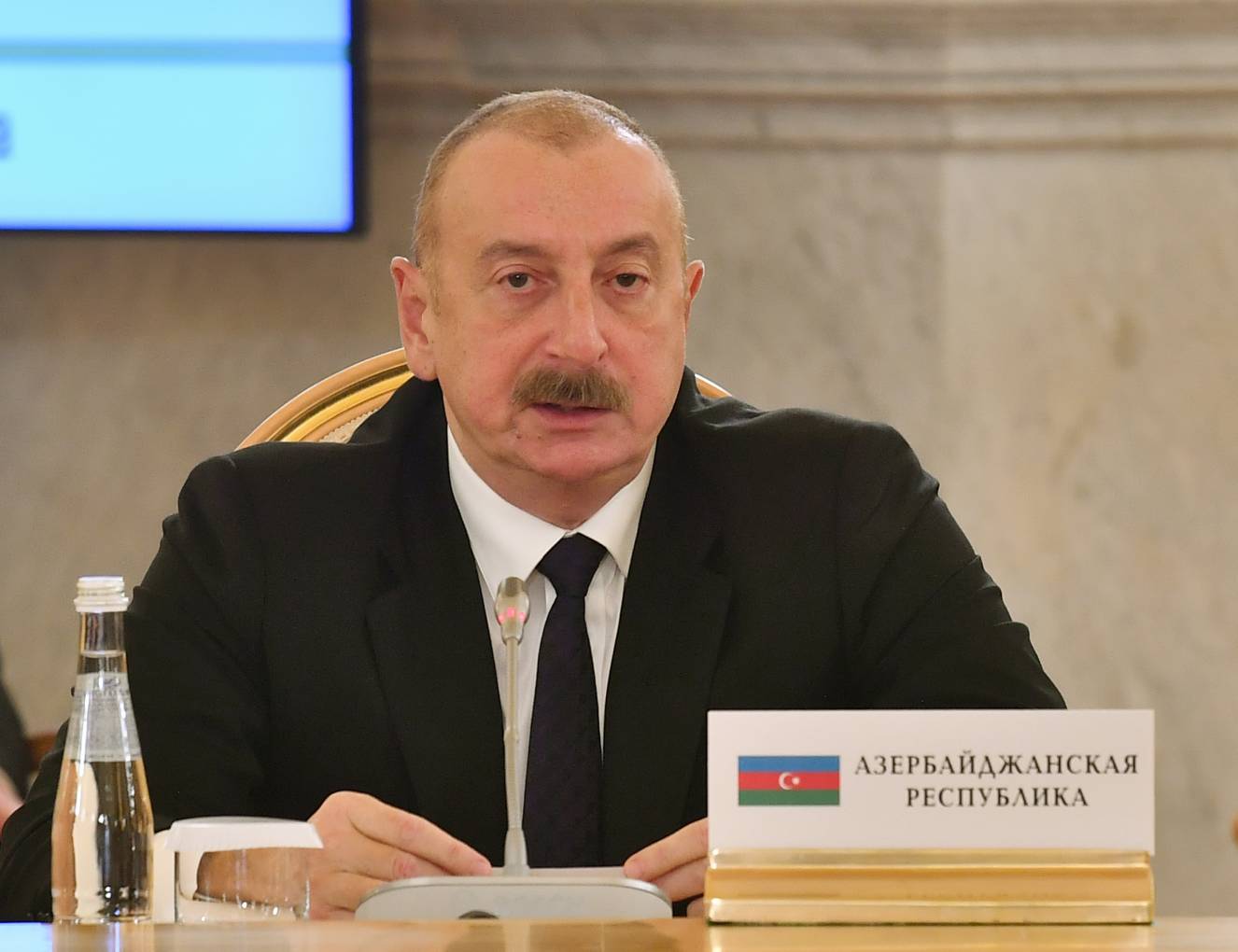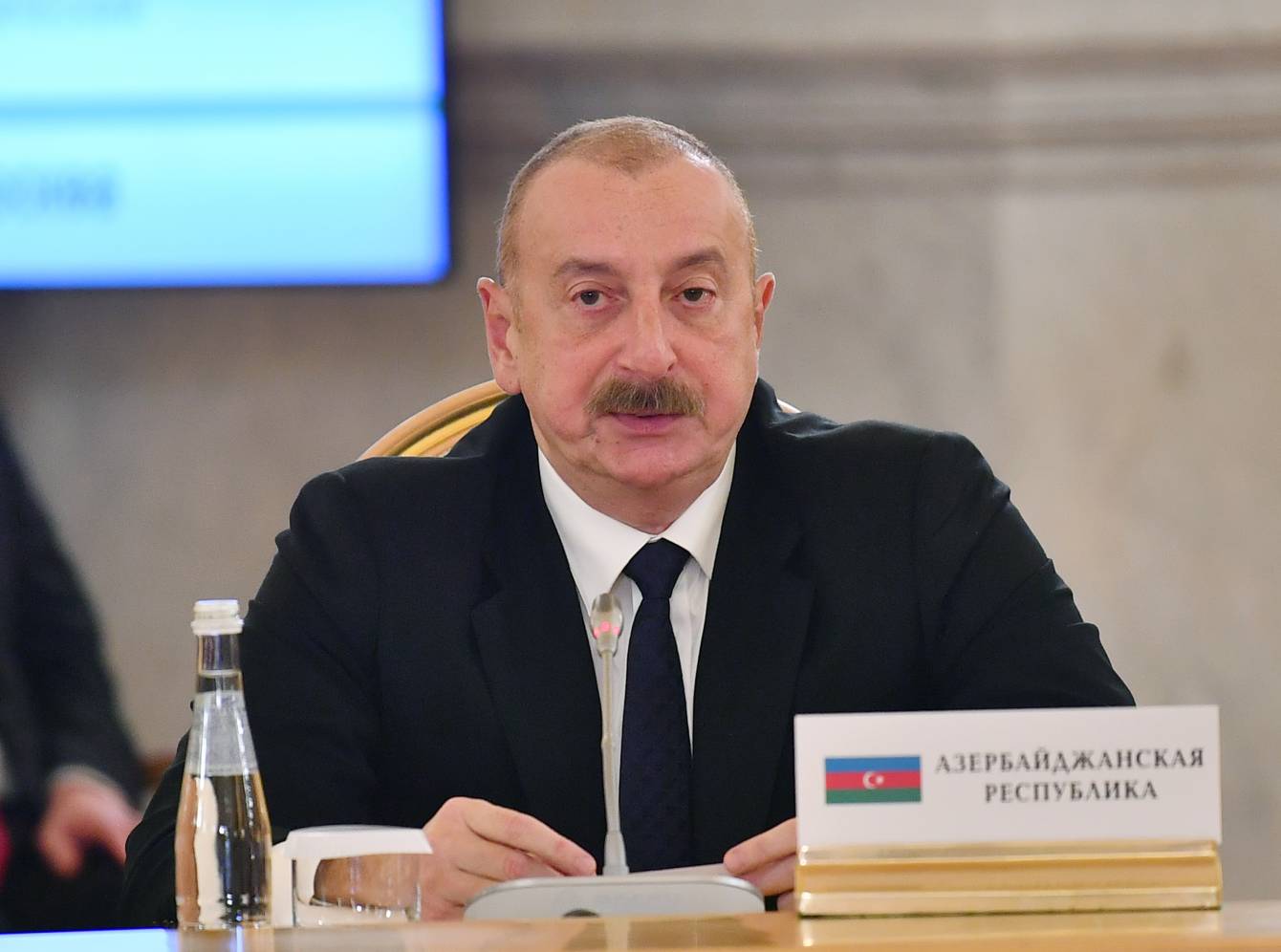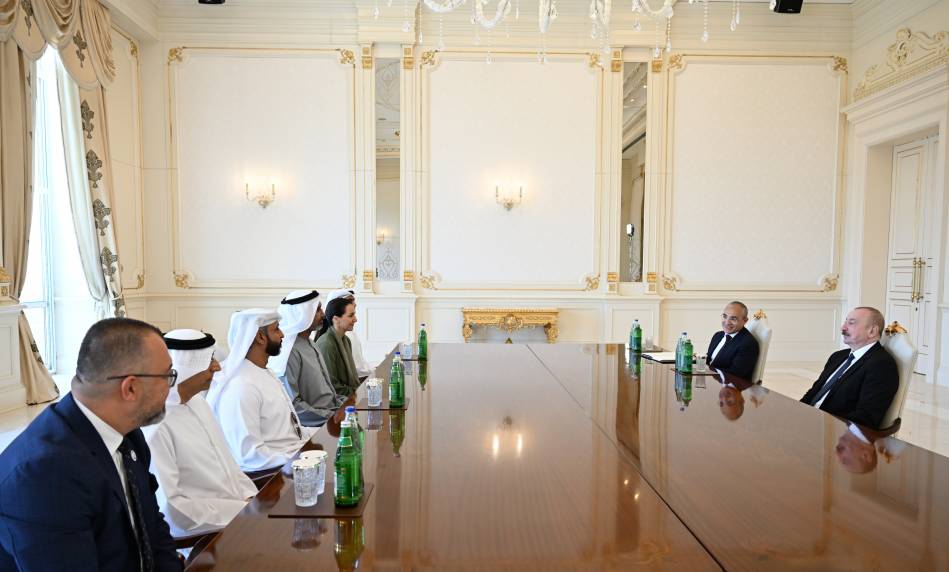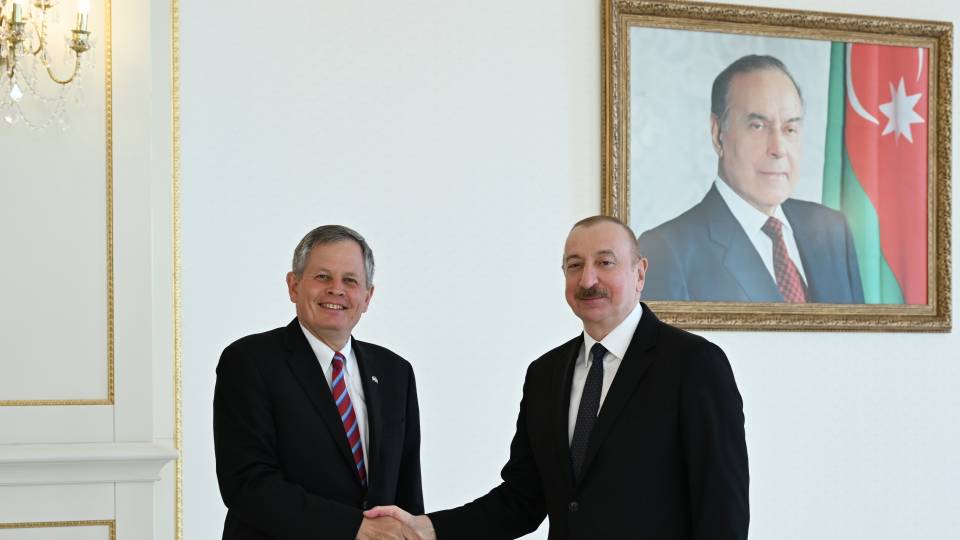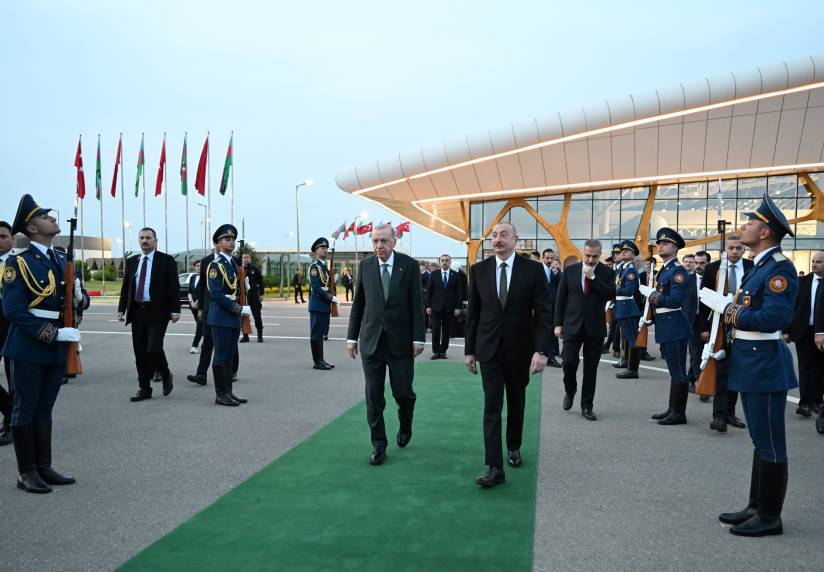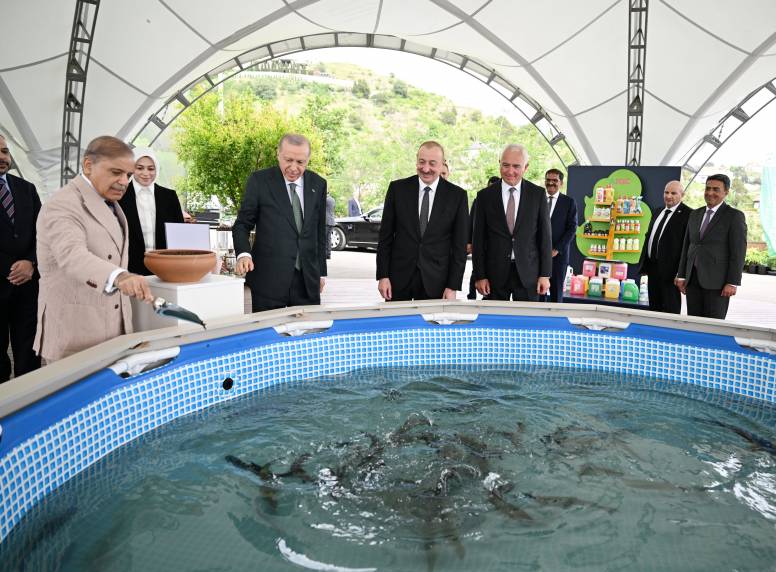An expanded Supreme Eurasian Economic Council meeting has been held in Moscow.
President of the Republic of Azerbaijan Ilham Aliyev attended the event as a guest.
President of Russia Vladimir Putin opened the expanded meeting of the Supreme Eurasian Economic Council.
Mentioning that the President of Azerbaijan participates in the meeting of the Supreme Eurasian Economic Council as a guest, the Russian President said:
- I am pleased to note that the President of the Republic of Azerbaijan, Ilham Heydarovich Aliyev, is attending today’s meeting for the first time as a guest. I would like to welcome him and the delegation of Azerbaijan.
Then, heads of member countries attending the expanded meeting of the Supreme Eurasian Economic Council made their speeches.
President of the observer country, Uzbekistan Shavkat Mirziyoyev, joined the meeting via a video link to deliver his speech followed by a video message by the President of Cuba Miguel Diaz-Canel.
President of Russia Vladimir Putin said: I am pleased to give the floor to our guests. I am giving the floor to Ilham Heydarovich Aliyev, the President of Azerbaijan, who, I repeat, is attending an event of this kind for the first time. Ilham Heydarovich, you have the floor. Please.
The head of state addressed the meeting.
Speech by President Ilham Aliyev
- Dear Vladimir Vladimirovich.
Dear heads of state, dear participants of the meeting.
First, I would like to express my gratitude to the President of Russia, Vladimir Vladimirovich Putin, for the invitation to participate in the summit of the EurAsEC member states as a guest.
Azerbaijan's cooperation with EurAsEC member countries, with the exception of Armenia, has been successfully developing for 30 years. There are tangible opportunities for normalizing relations between Azerbaijan and Armenia based on mutual recognition of territorial integrity and sovereignty. Today, on the initiative of the Russian side, a trilateral meeting of the heads of Russia, Armenia and Azerbaijan will take place.
I want to inform my colleagues that Azerbaijan's turnover with the EurAsEC countries increased by 31 percent last year and amounted to $4.7 billion. In January-April this year, the growth of mutual trade increased by another 38 percent. Last year, the share of EurAsEC member countries in Azerbaijan's foreign trade reached about 9 percent. We are seeing enormous potential for further trade growth. Azerbaijan is located at the geographical crossroads of the East-West and North-South transport routes. The transportation and logistical infrastructure of our country enables transportation in any direction. With more than 50 ships, Azerbaijan has the largest trade fleet in the Caspian. The seaport of Alat, designed to transport 15 million tons of cargo, will be modernized shortly, and its cargo handling capacity will reach 25 million tons. This is particularly important given that a significant increase in cargo transportation through Azerbaijan has been observed recently.
A modern shipbuilding yard has been operating in Baku for several years now. It can manufacture any vessel, and I am pleased to announce that Azerbaijan’s shipbuilding capabilities have also been made available to our neighbors in the Caspian Sea today. Negotiations and extensive work are underway to place the orders of our neighbors in the Caspian Sea at the shipbuilding plant in Baku.
The Baku-Tbilisi-Kars railway provides access to Europe, as well as to the Mediterranean ports of Türkiye. Azerbaijan is an essential participant in the North-South transport corridor project. We have also initiated the creation of the Zangezur corridor, which will connect the country's central part with the Nakhchivan Autonomous Republic and become a part of international railway routes.
There are eight international airports in Azerbaijan, two of which, located in Fuzuli and Zangilan, on the lands liberated from occupation, were built over the past two years. The ninth international airport is under construction in the liberated Lachin and will be put into operation in 2025. Our country has one of the largest air cargo fleets in the region, with a cargo turnover of more than 500,000 tons per year.
The Azerbaijani economy has been demonstrating stability and growth throughout almost the entire period of independence. We have achieved complete economic independence, which is an important factor in pursuing independent foreign policy, and we are successfully doing that. For nearly four years now, Azerbaijan has successfully chaired the Non-Aligned Movement, which has 120 member countries and is the second-largest international body after the UN.
Azerbaijan’s economy is self-sufficient and does not need foreign support. Over the past 20 years, the gross domestic product of our country has more than tripled, and the poverty rate has been reduced from almost 50 to 5 percent. Our external debt is almost at less than 9 percent of the GDP and has been declining year on year, and Azerbaijan's foreign exchange reserves exceed the external debt ten times.
Today, one of the critical tasks we face is the diversification of our exports. As for the diversification of the economy, this issue is being resolved successfully. Most of the Azerbaijani economy is already forming in the non-resource sector. As for our exports, we still need to work hard to increase the exports of the non-primary sector.
Although the unemployment rate is only at 5 percent, our demographic growth – over the past 30 years, the population of Azerbaijan has grown from 7 to 10 million – requires active efforts to create new jobs. Of course, we look forward to strengthening our interactions with EurAsEC member countries in a bilateral format – which we are successfully doing already – and in a multilateral format.
As already noted, this is my first time participating in the EurAsEC summit. However, we meet with the heads of the EurAsEC member states regularly, both within the framework of the CIS summits and in a bilateral format. So, even though I am participating for the first time as a guest, I am certainly not a guest here. Today we had the opportunity to talk, and our communication will continue. In conclusion, I would like to again express my gratitude to you, Vladimir Vladimirovich, for the invitation and to all my colleagues for supporting this invitation. Thank you.
Vladimir Putin: Thank you very much. Indeed, Azerbaijan's economic relations with our member countries in a bilateral format are constantly growing and are essential for all of us – both for Azerbaijan and for each member country of the organization.
X X X
Then, the President of Tajikistan, Emomali Rahmon, made an address via a video link.
President Vladimir Putin: As I have already said, we are actively developing bilateral relations with Azerbaijan and Tajikistan. Therefore, joining in such a multilateral format, of course, will only be beneficial. Ultimately, Tajikistan and Azerbaijan will decide how deeply they would like to be involved in the work of our organization. The same fully applies to Uzbekistan.
Thank you very much, colleagues, for our joint work today and your participation. I would like to give the floor to the Chairman of the Commission of the Eurasian…
Prime Minister Nikol Pashinyan: I am sorry, Vladimir Vladimirovich. May I? I have a small remark.
President Vladimir Putin: Please.
Prime Minister Nikol Pashinyan: In his speech, the President of Azerbaijan used an expression used in recent years as a title for putting forward territorial claims against Armenia. I want to note that this is being used as part of the implementation of paragraph 9 of the Trilateral Statement dated November 9, 2020. I want to emphasize that this Statement refers to only one corridor, the Lachin corridor. It was supposed to be under the control of Russian peacekeepers, but, unfortunately, it was illegally blocked by Azerbaijan. On the other hand, I want to confirm the readiness of the Republic of Armenia to unblock all transport and economic ties in the region and communications that pass through the territory of the Republic of Armenia – we call it the Armenian intersection. We are ready to open regional communications within the sovereignty and jurisdiction of the countries through which they pass. I mean the transport and economic communications implied under paragraph 9 of the Trilateral Statement of November 9, 2020, and the Trilateral Statement of January 11, 2021. Thank you.
President Vladimir Putin: Thank you very much. But what I heard from President Aliyev's speech is that he was talking about the fact that conditions are being created in connection with the recognition of the corresponding borders confirmed by agreements, which have existed since 1991. These conditions give us a reason to believe that appropriate agreements can be reached between Armenia and Azerbaijan, including those on transport communications.
I am delighted to note that the Prime Minister of Armenia said that Armenia also thinks about this attitude, considers it possible, and thinks positively. But I think we could discuss all this at a trilateral meeting today. I hope to agree on what is obviously in economic development interests for Azerbaijan, Armenia, and the entire region. We will have time to discuss all this in a trilateral format in detail.
President Ilham Aliyev: Of course, I do not want to start a debate, but since there has been an accusation that we have territorial claims against Armenia, I want to say that we have no such claims. In my words, you have to try very hard or have a wild imagination to see territorial claims. As for the word “corridor” that I used, I used the same word for the North-South corridor, just as the same word is used for the East-West corridor.
The word “corridor” is in no way an encroachment on someone's territory. This is an international term, and I think people familiar with international terminology would probably not attach the meaning that the Prime Minister of Armenia attaches to it today. As Vladimir Vladimirovich has noted, I believe there are opportunities to reach a peace agreement, especially considering that Armenia officially recognized Karabakh as part of Azerbaijan. Thank you.
Prime Minister Nikol Pashinyan: I am sorry, Vladimir Vladimirovich. I have to emphasize that everyone familiar with the text of the Trilateral Statement of November 9, 2020, knows that there is only one use of the word “corridor” in that Statement. In this context, the word has a special meaning. It is about the Lachin corridor, which, I repeat, should be under the control of the Russian Federation as per the trilateral Statement and provide a link between Nagorno-Karabakh and Armenia. But unfortunately, Azerbaijan has illegally blocked this corridor in the presence of Russian peacekeepers. On the other hand, I want to confirm that Armenia and Azerbaijan have agreed on the mutual recognition of each other's territorial integrity. And on this basis, we can say we are progressing pretty well.
Regarding the settlement of our relations, I want to point to a very important issue in this context - the issue of the rights and security of the residents of Nagorno-Karabakh within the framework of the international mechanism. I hope Baku and Stepanakert will soon begin a normal and constructive dialogue. Thank you.
President Vladimir Putin: Thank you very much.
President Ilham Aliyev: Vladimir Vladimirovich, excuse me, of course. But there was an accusation in the words of the Prime Minister of Armenia again. If you noticed, there were no accusations in my words during the speech or the remarks. But I can't just leave that unanswered. I understand that we are diverting the discussion in a slightly different direction, although I think this interests many. Please allow me to answer and say Azerbaijan has not blocked any corridor. As for the Lachin-Khankendi road, it is open. On the border between Armenia and Azerbaijan, which you recognize, a border checkpoint has been set up under all international standards. This border checkpoint is located 20 meters from the post of the Russian peacekeeping contingent. And today, through this border checkpoint, residents of Azerbaijan of Armenian origin, who live in Karabakh, can freely move toward Armenia. There are no obstacles, including those for patients whom the Red Cross transports and ambulances from the city of Khankendi. Any unbiased person, of course, should be able to see this. There is no need to attempt to use the platform for unfounded accusations. As for the corridor I spoke about, the Zangezur corridor, if you listened carefully to my speech, it said: “Azerbaijan initiated the creation of the Zangezur corridor.” It is our right to initiate anything – whatever we consider appropriate, legitimate, reasonable, and what, by the way, is supported by the Russian Federation and other parties involved in the process of settling relations between Armenia and Azerbaijan.
Prime Minister Nikol Pashinyan: Very interesting, thank you. I am very sorry, Vladimir Vladimirovich. I am very interested to know whether Russia supports the project you mentioned. Honestly, this is the first time I have heard about it. I know that Russia supports opening all transport and economic communications in our region. You have mentioned the Lachin road. According to our Trilateral Statement, the Lachin road does not exist; there is the Lachin corridor, which, according to the Trilateral Statement signed by the three of us, should be controlled by the Russian peacekeeping forces. So, no one else should have any control in this corridor. And what is happening there represents a direct violation of the Trilateral Statement. And you noted that the corridor was open. We don't see it. We do not think so. Therefore, we consider it important that an international mission should be sent to both the Lachin corridor and Nagorno-Karabakh, which would assess the humanitarian situation in Nagorno-Karabakh. I must say that, unfortunately, we have had a humanitarian crisis there since December because the supply of food and necessary products, the supply of gas and electricity, was cut off from Azerbaijan due to the closure of the Lachin corridor. Impediments are being created, and this is a very serious situation. I mean the gas and electricity that enter Nagorno-Karabakh. And Vladimir Vladimirovich, you are very well aware of this because we have spoken about this more than once. I am sorry, but it turns out that…
President Vladimir Putin: Colleagues have expressed their position, formulated it, and it is essential for them. I want to say the following at the end of this part; it seems that the terminology that the three of us, in any case, are very well aware of is called legal technicalities. Corridor, road, etc. - this is important, and there is a certain contradiction in that. But much more important is what you have just said – both the President of Azerbaijan and the Prime Minister of Armenia – that there is an agreement in principle on the main issue, the issue of territorial integrity. And this is the basis for agreeing on other somewhat secondary matters. Although they are also important, now we will have the opportunity, as we agreed in a trilateral format, to talk about everything calmly in a businesslike manner. I hope to reach some agreements that will put the situation not only between Armenia and Azerbaijan but also in the region as a whole on the path of constructive development.
I want to assure you that everyone here is interested in that - absolutely everyone. Alexander Grigoryevich spoke quite convincingly about this today in a closed format. Because, after all, what can I say? There are former republics of the Soviet Union here. We used to live in a single family of people, and here, unfortunately, we have many contradictions, including armed conflicts. In Russia, the same thing is happening in a well-known direction. Therefore, all this is very sensitive, and all this is connected with human tragedies. We are all interested in having all these problems resolved. Concerning this situation, I repeat, we will have the opportunity to talk in a trilateral format, and I am also grateful to the Prime Minister of Armenia for visiting, to the President of Azerbaijan for attending, and to the Prime Minister of Armenia for not blocking this visit, so that we could all get together and talk about these sensitive topics.
X X X
Then, the Board of the Eurasian Economic Commission Chairman, Mikhail Myasnikovich, made an address.
Heads of member states signed the final documents of the meeting.
President of Russia Vladimir Putin summed up the results of the meeting.

